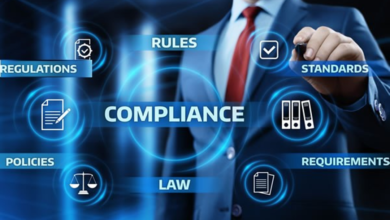Intellectual Property in Business Law: Latest Developments for 2024
Intellectual Property in Business Law 2024 explores key legal changes, trends, and strategies for protecting and leveraging IP assets effectively.

For businesses looking to protect their ideas and stay ahead of the competition, intellectual property legislation is crucial. As we approach 2024, the IP landscape is undergoing profound changes propelled by governmental changes and technological breakthroughs. The systems in place to safeguard intellectual property, such as copyrights, trade secrets, and patents, are become increasingly sophisticated and resilient. It’s imperative for firms to stay abreast of these developments in order to properly utilise their intellectual property rights and handle any upcoming legal issues.
The most recent changes to IP law demonstrate the international effort to improve protections and harmonise laws across nations. As AI-generated innovations proliferate and digital rights management becomes more crucial, companies need to modify their approaches to remain compliant and competitive. Comprehending the subtleties of these modifications will aid in safeguarding intellectual property and seizing fresh chances for expansion and novelty. With a focus on commercial law, this article explores current developments, legislative revisions, and the prospects for intellectual property in the future, offering stakeholders insightful information.
Intellectual Property in Business Law
Intellectual property encompasses creations of the mind, such as inventions, literary and artistic works, designs, symbols, names, and images used in commerce. The main types of IP include:
Patents
Patents protect new inventions and provide the patent holder with the exclusive right to use, sell, and license the invention for a set period, typically 20 years. Recent changes in patent law aim to enhance protection and streamline the application process.
Trademarks
Trademarks protect brand names, slogans, and logos that distinguish goods and services in the marketplace. Evolving regulations focus on global trademark harmonization and tackling infringement issues.
Copyrights
Copyrights protect original works of authorship, such as books, music, and software. Digital copyright changes and fair use adjustments are significant recent developments.
Trade Secrets
Trade secrets include formulas, practices, processes, designs, instruments, or compilations of information that give a business an advantage over competitors. Strengthened trade secret protections have been introduced to better safeguard these critical assets.
The Role of IP in Business Strategy
Protecting Innovations
IP rights protect innovations, ensuring that creators can reap the benefits of their inventions. This protection encourages further innovation and investment in R&D.
Building Brand Identity
Trademarks and copyrights help build and maintain brand identity. A strong brand is a valuable asset that can differentiate a company from its competitors.
Generating Revenue Through Licensing
Licensing IP can be a significant revenue stream. Companies can license their patents, trademarks, and copyrights to other businesses, creating new income opportunities.
Changes in Patent Law
Enhanced Patent Protection
Recent changes aim to strengthen patent protection, making it easier for inventors to secure and defend their patents. This includes streamlined application processes and better enforcement mechanisms.
Patent Litigation Updates
Patent litigation continues to evolve, with courts refining the standards for infringement and damages. This has significant implications for how businesses protect their innovations.
Evolving Trademark Regulations
Global Trademark Harmonization
Efforts to harmonize trademark laws globally are gaining momentum. This makes it easier for businesses to protect their brands across multiple jurisdictions.
Trademark Infringement Cases
Recent high-profile trademark infringement cases highlight the importance of vigilant brand protection. Courts are increasingly willing to award substantial damages to protect brand integrity.
Copyright Reforms
Digital Copyright Changes
The digital age has brought about significant changes in copyright law. New regulations aim to address issues like online piracy and the distribution of digital content.
Fair Use Adjustments
Adjustments to fair use doctrine reflect the changing nature of content creation and distribution. These changes aim to balance the interests of creators and consumers.
Trade Secret Legislation
Strengthened Protections
New legislation strengthens trade secret protections, ensuring that businesses can safeguard their proprietary information more effectively.
Impact on Business Practices
These changes require businesses to adopt new practices for protecting and managing their trade secrets, impacting everything from employee agreements to data security measures.
Case Studies of IP in Business
Successful IP Strategies
Several companies have successfully leveraged their IP portfolios to gain a competitive edge. For instance, Apple’s strategic use of patents and trademarks has been instrumental in maintaining its market dominance.
Lessons from IP Disputes
IP disputes offer valuable lessons for businesses. High-profile cases, such as the ongoing battles between tech giants, highlight the importance of robust IP strategies and the potential consequences of IP infringement.
The Role of AI in IP
AI-Generated Inventions
AI is transforming the IP landscape, with AI-generated inventions posing new challenges for patent law. Determining the ownership and protection of these inventions is a hot topic.
AI in IP Management
Artificial Intelligence (AI) tools are also being used to manage IP portfolios more efficiently, from patent searches to monitoring for infringement.
Blockchain and IP
Blockchain for IP Protection
Blockchain technology offers new ways to protect IP, providing immutable records of creation and ownership that can help prevent infringement.
Digital Rights Management
Blockchain can also enhance digital rights management, making it easier to track and enforce IP rights for digital content.
Global Perspectives on IP
International IP Treaties
International treaties play a crucial role in IP protection, facilitating cross-border enforcement and harmonization of IP laws.
IP in Emerging Markets
Emerging markets present unique challenges and opportunities for IP protection. Businesses need to navigate different regulatory environments and enforcement mechanisms.
Cross-Border IP Challenges
Cross-border IP challenges, such as differing legal standards and enforcement practices, require businesses to adopt comprehensive global IP strategies.
Future Trends in IP
The Rise of Non-Traditional IP
Non-traditional IP, such as genetic resources and traditional knowledge, is gaining recognition and protection, reflecting the evolving nature of IP.
Sustainability and IP
Sustainability is becoming a key consideration in IP law, with new regulations encouraging the development and protection of green technologies.
IP and the Gig Economy
The gig economy presents unique IP challenges, particularly in terms of ownership and protection of work created by gig workers. New legal frameworks are emerging to address these issues.
Read More: How to Improve Patient Care: Best Practices for Healthcare Professionals
Conclusion
Intellectual property in corporate law is still a critical and dynamic topic as we move forward. The most recent developments for 2024 highlight how crucial it is to manage intellectual property assets with awareness and initiative. Enterprises that adeptly manoeuvre across the dynamic terrain of patents, trademarks, copyrights, and trade secrets shall be in a better position to safeguard their discoveries, preserve their competitive advantage, and seize novel market prospects. Adopting cutting-edge technologies like blockchain and artificial intelligence can improve IP enforcement and management even further, offering a strong framework for protecting intellectual property.
Business law’s treatment of intellectual property has a bright future ahead of it. Businesses that want to effectively utilise their intellectual property rights in the face of shifting laws and rapid technological development must be alert, flexible, and knowledgeable. By doing this, they may reduce the risks related to IP infringement and conflicts and guarantee long-term growth and innovation. It takes more than simply legal compliance to stay on top of IP legislation; it takes strategic economic advantage and long-term success in a global market that is changing quickly.
FAQs
What is the most important type of intellectual property for businesses?
The most important type of IP depends on the business. For tech companies, patents are crucial, while trademarks are vital for consumer goods companies.
How can small businesses protect their intellectual property?
Small businesses can protect their IP by registering patents, trademarks, and copyrights, using non-disclosure agreements, and implementing robust data security measures.
What are the consequences of IP infringement?
Consequences of IP infringement can include legal action, financial penalties, and damage to reputation. It can also lead to loss of market share and revenue.
How is technology changing the landscape of intellectual property?
Technology, such as AI and blockchain, is changing IP by introducing new types of creations and enhancing IP management and enforcement mechanisms.
What should companies expect in the future regarding IP laws?
Companies should expect ongoing changes in IP laws, driven by technological advancements and global regulatory efforts. Staying informed and adaptable is key to navigating this evolving landscape.











